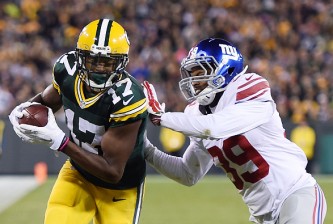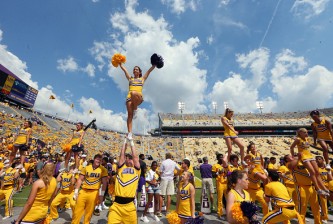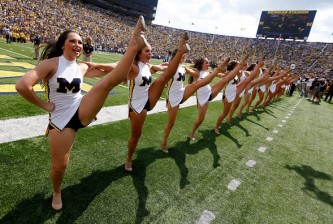In the wake of the news of CBS Radio’s announcement that it will create an FM sports radio station in Boston this August, I got in contact with former ESPN Radio talk show host Chuck Wilson to talk about the upcoming battle between WEEI and the new WBZ-FM (aka “The Sports Hub”). I felt Chuck could give some interesting perspective having been a long-time talk show host in the New England area and also on the national level.
Chuck is well known in New England having moved to Providence in 1981 where he first worked for news/talk WEAN where he hosted “Chuck Wilson on Sports”. His show was the first in New England to use weekly contributors such as Peter Gammons, Bob Ryan and Mel Kiper, Jr.
He moved to WICE-AM in 1986 after WEAN was sold and remained there until 1989 when he switched to WPRO-AM. In 1993, Chuck left WPRO and joined ESPN Radio full-time where he had helped to launch the national network two years earlier.
Wilson left ESPN Radio in July 2005 and joined XM Satellite Radio soon afterward as a host on its MLB Home Plate Channel. He left in November of last year, a victim of the Sirius XM merger.
Chuck is currently living in Rhode Island. He has a website that offers his opinions on sports.
We exchanged e-mails over the last two days on WEEI and WBZ-FM. The interview is seen below.
Fang’s Bites: You’ve worked in New England area, most notably Providence and you’ve observed WEEI from RI. What is it that makes WEEI the 800 lb. gorilla in the region?
Chuck Wilson: WEEI has produced compelling sports talk for a long time and become one of the most successful radio stations in the country mostly due to smart, talent-driven programing. It has a clear, consistent identity. No one has done what they’ve done any better.
WEEI has understood from the beginning the value of having hosts passionate about hot-button issues.
WFAN in New York with Mike and the Mad Dog provided the dual-host blueprint. It isn’t easy. You want hosts that approach sports from different points-of-view, but you can’t just throw two individuals together and expect magic. You need them to develop an on-air chemistry, and that is something that can’t be forced. It either happens or it doesn’t.
WEEI Program Director Jason Wolfe knows talent and he has been effective, as was Glenn Ordway, at putting together combinations of hosts that create sparks and can play off each other. That’s number one.
Second, WEEI has done an excellent job covering sports news. If there has been a breaking story in Boston sports, WEEI has been THE station to tune to for coverage. The station has also benefited by its arrangements with athletes and teams for regular appearances on the station as a means to develop on-air relationships, break news and limit the access other talk stations have to some high-profile, professional athletes. WEEI “broke” a lot of stories thanks to its relationship with Curt Schilling and the weekly exclusive appearances of Tom Brady and Bill Belichick have been valuable in promoting listener loyalty and increasing TSL (time spent listening), key factors in building ratings.
FB: You’ve mentioned the strengths of WEEI such as its strong personalities and covering sports news. Is there an area where WEEI is vulnerable?
CW: The minute you think you’re the best and can’t be beat, you‘re in trouble. Any station is vulnerable to strong competition. It would be a surprise if “The Sports Hub” doesn’t mount a significant challenge. With the backing of CBS, they will have the resources. WEEI will respond and raise its game. Some listeners have formed strong attachments to particular shows and personalities but if “The Sports Hub” gets off to a good start, many listeners figure to go back and forth deciding day-to-day which station is more informative and entertaining — which station covers the teams better, has better guests, and provides smarter, more compelling talk.
FB: What can The Sports Hub do that other competitors (1510 AM/ESPN890) could not against WEEI?
CW: There has been a peculiar station ownership dynamic in the Boston media market. Until now, no station with a strong signal has challenged WEEI in the market.
That was the fundamental reason why the efforts on 1510 AM and 890 AM (ESPN Radio Boston) really were doomed from the start — weak signals.
In radio, you can’t compete if you can’t be heard.
The decision to put “The Sports Hub” on the 98.5 FM signal is a smart move. Its coverage area is excellent and FM has the advantage of “no static”. It’s easier to listen to an FM signal than an AM signal. That’s a vital first step — WBZ-FM has the signal strength to compete.
FB: Should The Sports Hub try to be a clone of WEEI or try to make itself totally different?
CW: This is an interesting question. WEEI is such an established entity that it seems logical to provide an alternative approach.
What approach?
Everything today is based on immediacy. That is a strength of radio. Take advantage of it. Cover the local sports scene better than anyone else. Take listeners inside the game as much as possible. Provide as much insight and informed opinion as you can through interviews, team coverage and expert opinion. Tell listeners something they didn’t know — inform and entertain them.
To me, THE most important challenge for “The Sports Hub” is to establish credibility with sports fans. That doesn’t just mean hiring on-air hosts with credibility. It means being everywhere, hustling for stories, interviewing athletes and being seen. It means establishing trust with the local teams and players. And when a story “breaks”, they’ll have to be all over it. You don’t have to be first with every story, but you can’t be second.
Many listeners to WEEI like what they hear but others listen even if they aren’t fans of a particular show. They listen because they know if sports news breaks, WEEI will have it. “The Sports Hub” must create the mindset with its listeners that if you tune out, you are going to miss something important.
That perception, that trust, won’t be earned overnight. It will take strong, on-site beat reporters; smart, aggressive producers and hosts asking the right questions. The attention is always paid to the on-air talent but the reporters, producers and engineers will have a significant impact on the success of the new station.
Callers can add a lot to a show if used to further the goal of providing insight and perspective in an entertaining way. Shows are best aimed at listeners, not callers. 98% of listeners don’t call in to talk shows. Keep callers focused and on topic. If callers don’t have something constructive to add to the conversation, don’t put them on-the-air. But if they have a good point, let them make it and in cases where the caller has a good point, but uses a poor example, dismiss the example but address the good point rather than just make fun of the caller . In other words, bring out the “best” of what callers have to say rather than the “worst”.
FB: Do you think The Sports Hub should use single hosts or go with a duo or trio for its shows?
CW: The dual-host approach has several advantages. Two opinions on any topic tends to spark more entertaining conversations. It gives a show two personalities to attract listeners and callers. It provides continuity in the case of illness or vacation by having at least one of the co-hosts on the air. And it usually results in better interviews. One added benefit is that it discourages monologues and solo rants that go on too long.
It sounds as if “The Sports Hub” may go with solo hosts in the mid-day
and afternoon drive with a rotating co-host for each show. That can be effective, too, though on-air chemistry may differ day-to-day and there may be times when a story breaks in one sport while you have an expert in another sport as co-host.More than two in the booth can be very entertaining depending on the mix of personalities. One dominant voice can overpower the show but it can work well, especially if the show doesn’t take calls. When you add callers to a three-person show, it tends to lead to a lot of talking over one another.
FB: Would it behoove WBZ-FM to tie in with the sports staff of WBZ-TV to help cover the local sports teams?
CW: You would think that the station will look to take advantage of every available synergy. WBZ-TV’s “Patriots All-Access” could provide some exclusive content.
FB: WBZ-FM has the Patriots game broadcasts while WEEI has Patriots Monday and other ancillary programming surrounding the team. Could the Patriots become a big battleground between the two stations?
CW: There is no question about it. When you have the broadcast rights, you make the most of it with as much team-related programing as possible, while trying to contractually limit what other stations can do. If you don’t have the contract, you try to be creative and aggressive in forging relationships with the team so that you can position yourself as a strong alternative for coverage.
What WEEI has done with the Patriots as a non-rights holder with its Patriots Monday and Friday shows featuring Tom Brady and Bill Belichick provide a textbook example of how to do it. Sponsors want to be associated with popular teams, so stations look for every way possible to tie-in sponsors to team-related programs. Much of the stations’ sales revenue is dependent on this dynamic, so look for the two stations to continue to look for ways to bring the players and teams closer to the fans.
FB: With the area pro sports teams divided between WBZ-FM (Patriots and Bruins) and WEEI/WRKO (Red Sox and Celtics), do you foresee a bidding war for the properties as long as CBS Radio and Entercom keep their stations afloat?
CW: All-Sports stations have to have Play-by-Play of local teams to be successful. Even when the rights fees are high (such as with the Red Sox and Patriots), stations have to have these anchors for programing and especially for sales. Add to it that Play-by-Play properties are more important in the Boston market than in almost any other market in the country because Boston-area fans are all about the local teams. Big national events like the Super Bowl, World Series, NBA Finals and Stanley Cup Playoffs do not rate as well in Boston as in other big markets unless a local team is playing. So, sure, the two companies will compete for local play-by-play, but it will be more of an issue down the road since the local team contracts are tied-up for right now.
FB: WEEI’s owner, Entercom has expanded the station’s brand through a radio network and a web presence. Do you think CBS Radio will have to do that with WBZ-FM?
WEEI wisely added 103.7 FM in Rhode Island to simulcast the AM product. That move increased the reach and audience numbers and effectively eliminated any on-air competition from Rhode Island while boosting coverage in parts of Massachusetts.
With its strong FM signal, “The Sports Hub” doesn’t have to be concerned about covering the metro Boston area but it would make sense to add stations and increase its regional footprint over time.
As for a strong web presence, that figures to be a goal for “The Sports Hub”.
The internet and multimedia distribution is the future. With listeners getting information instantly on-line and through hand-held devices, everyone has to take advantage of the digital platform and the emerging technologies. Websites offer stations a way to cross-promote the name brand and open up important new revenue streams. For sports fans, it’s another way to stay on top of the sports they care about. WEEI is doing it well. CBS has a strong brand name. It can use sports talent from its other network affiliates and it’s national personalities to provide exclusive insights, both on-air and on the new website. Expect CBS to use that strength on all of its owned stations. Content is king. Both WEEI and WBZ-FM will be touting their exclusivity.
FB: Do you see this as a marathon between Entercom and CBS Radio or will there be a real clear cut winner between the two?
CW: When “The Sports Hub” first hits the air next month, there will be a curiosity factor. Many sports talk listeners will check out the new station. So getting out of the blocks with few glitches is important.
It is a challenging market place with diminished national and regional advertising dollars. What level of resources will CBS devote to this new venture? How well will CBS take advantage of its national and affiliate talent to provide exclusive regular appearances on “The Sports Hub”? How quickly can the new station attract the advertising revenue needed to support what is an expensive format?
There is room for two sports station given the passion of Boston-area sports fans. The numbers WEEI has with male listeners has been coveted in the Boston market for some time. CBS has decided to go after them.
If WBZ-FM provides its own brand of compelling content, WEEI likely will respond by sharpening its approach. The competition figures to bring out the best in both — two sports stations with strong signals.
It’s a win-win for area sports fans.
I’d like to thank Chuck for taking the time to respond to my e-mails. I hope to have Chuck talk about other subjects at Fang’s Bites in the near future.






















